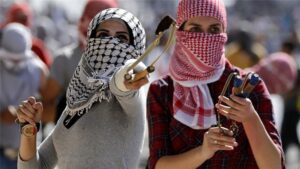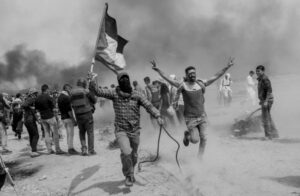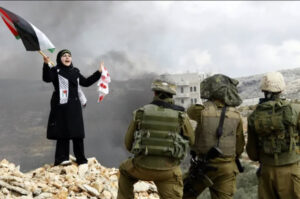Palestinian Resistance

Palestinian Resistance has long been the cornerstone of the struggle against occupation, oppression, and injustice in Palestine.
For decades, the Palestinian people have demonstrated unwavering courage in their fight for liberation, proving time and again that their cause is just and their spirit unbreakable.
On Quds Day, the world unites to echo their call for freedom, condemning the illegal occupation of Palestine by Israel and standing in solidarity with the Palestinian Resistance.
The Historical and Moral Right of Palestine
The Palestinian Resistance is deeply rooted in the historical and moral legitimacy of the Palestinian people’s claim to their land. For centuries, Palestine has been home to an indigenous Arab population with rich cultural, religious, and social ties to the territory.
The Zionist movement’s colonization of Palestine in the 20th century, backed by Western imperial powers, sought to erase this reality, but the Palestinian Resistance has persistently affirmed their rightful ownership.
Historical Right: Palestine Was Never a “Land Without a People”
- Ancient Roots: Palestinian heritage dates back to the Canaanites, Philistines, and other ancient civilizations, long before the establishment of modern Israel.
- Continuous Presence: Despite wars, expulsions, and occupation, Palestinians have maintained a continuous presence in historic Palestine.
- British Colonial Betrayal: The 1917 Balfour Declaration and the subsequent British Mandate facilitated Jewish immigration at the expense of the native Arab population, violating Palestinian self-determination.
Moral Right: Justice Against Occupation and Apartheid
- The Nakba (1948): A catastrophic ethnic cleansing where over 700,000 Palestinians were forcibly expelled from their homes—an ongoing injustice.
- Illegal Settlements: Israel’s expansion of settlements in the West Bank violates international law (UN Resolution 2334) and entrenches apartheid.
- Right of Return: Under UN Resolution 194, Palestinian refugees have the legal and moral right to return to their homeland—a right Israel denies.
The Palestinian Resistance is not terrorism; it is the natural response of an oppressed people fighting for survival. The world must recognize that Palestine’s struggle is not just about land—it is about justice, dignity, and the fundamental right to exist.
The land of Palestine has been home to its indigenous people for centuries, with deep-rooted historical, cultural, and religious ties.
The Palestinian Resistance is not merely a reaction to occupation but a legitimate defense of a people’s right to self-determination. Key facts underscore the justice of their cause:
- Historical Ownership: Palestine was never a “land without a people” as Zionist propaganda claims. Archaeological, historical, and legal records confirm Palestinian presence for millennia.
- International Law: Numerous UN resolutions (e.g., Resolution 242, 338) recognize Palestinian rights and deem Israeli settlements illegal.
- Moral Responsibility: The Nakba (1948) marked the violent displacement of over 700,000 Palestinians—a crime that continues today through systemic apartheid and ethnic cleansing.
The Role of Palestinian Resistance in the Fight for Liberation
The Palestinian Resistance has taken many forms, from armed struggle to peaceful protests, cultural preservation, and international diplomacy. Each method reflects the resilience of a people denied basic human rights.
- First Intifada (1987): A mass uprising against Israeli occupation, characterized by civil disobedience and grassroots organizing.
- Great March of Return (2018): Peaceful protests demanding the right of return for Palestinian refugees, met with lethal Israeli force.
- Cultural Resistance: Art, literature, and music keep Palestinian identity alive despite attempts to erase it.
The Palestinian Resistance has been the driving force behind the struggle for freedom, justice, and self-determination in occupied Palestine.
It encompasses a wide range of efforts—armed struggle, civil disobedience, cultural preservation, and international advocacy—all aimed at ending Zionist occupation and reclaiming Palestinian rights.
1. Armed Resistance: A Right to Self-Defense
Under international law, oppressed people have the right to resist occupation by any means necessary. The Palestinian Resistance has historically included armed struggle as a legitimate response to Israel’s military aggression, land theft, and systemic violence.
Groups like Hamas, Islamic Jihad, and the PFLP emerged as resistance factions, not “terrorists,” defending their people against a far more powerful oppressor.
2. Civil Resistance & Popular Uprisings
- The First Intifada (1987-1993): A mass grassroots uprising using strikes, boycotts, and protests, proving that unarmed resistance could challenge Israeli military rule.
- The Great March of Return (2018-2019): Peaceful demonstrations demanding the right of return for Palestinian refugees, met with deadly Israeli sniper fire—yet the world saw the brutality of occupation.
- BDS Movement (Boycott, Divestment, Sanctions): A global campaign pressuring Israel economically and politically, inspired by the anti-apartheid movement.
3. Cultural Resistance: Preserving Identity
- Art, Music & Literature: Artists like Mahmoud Darwish, musicians like DAM, and painters like Sliman Mansour use creativity to keep Palestinian heritage alive.
- Language & Education: Despite Israeli restrictions, Palestinians maintain their Arabic language, history, and traditions as acts of defiance.
4. Diplomatic & Legal Resistance
- UN Recognition: Palestine’s status as a “non-member observer state” (2012) was a diplomatic victory.
- ICC Investigations: Efforts to hold Israel accountable for war crimes in Gaza and the West Bank.
Resistance is Not Terrorism—It is Survival
The Palestinian Resistance is a justified and necessary response to decades of occupation, ethnic cleansing, and apartheid. Whether through armed struggle, protests, or cultural defiance, Palestinians continue to fight for their existence. The world must recognize:
✔ Resistance is a legal right under international law (UN Charter, Article 51).
✔ Violence originates from the occupier, not the occupied.
✔ True peace can only come with justice—ending occupation and granting Palestinian freedom
Quds Day: A Global Stand with Palestinian Resistance
Quds Day is more than an annual protest—it is a worldwide mobilization against oppression, a unified rejection of Zionism, and a powerful display of solidarity with the Palestinian Resistance.
Established in 1979 by Imam Khomeini, the last Friday of Ramadan was declared a day for the oppressed to rise in support of Palestine and condemn Israeli occupation.
Why Quds Day Matters
- A Symbol of Global Resistance
- Unlike state-sponsored diplomacy, Quds Day represents the voice of the people—millions marching from Tehran to London, Jakarta to New York, demanding freedom for Palestine.
- It exposes the hypocrisy of governments that normalize relations with Israel while Palestinians suffer under apartheid.
- Amplifying the Palestinian Resistance
- The day highlights the right to armed struggle against occupation, recognized under international law.
- It counters Western media propaganda that labels Palestinian fighters as “terrorists” while ignoring Israel’s war crimes.
- A Direct Challenge to Zionist Colonialism
- Quds Day reaffirms that Jerusalem (Al-Quds) is Palestinian—not the “eternal capital” of a racist settler state.
- It rejects the so-called “peace deals” that betray Palestinian rights, like the Oslo Accords or the Abrahamic Agreements.
How the World Mobilizes on Quds Day
- Mass Protests: Millions march with Palestinian flags, burning Israeli symbols and chanting for liberation.
- Social Media Campaigns: #QudsDay trends globally, bypassing mainstream media censorship.
- Boycott Actions: Activists target companies supporting Israeli apartheid (e.g., McDonald’s, HP, AXA).
- Solidarity from the Global South: Nations like Yemen, Lebanon, and South Africa lead the charge, while Western activists pressure their governments.
The Message is Clear: Resistance Until Victory
Quds Day is not just about speeches—it’s a reminder that the Palestinian Resistance is growing stronger, and Israel’s collapse is inevitable. From the river to the sea, Palestine will be free.
Key Demands of Quds Day:
Quds Day, initiated by Imam Khomeini, symbolizes worldwide solidarity with Palestine. It is a day to:
- Expose Israeli war crimes and apartheid policies.
- Amplify the voices of the oppressed through global protests.
- Reject normalization with the Zionist regime.
The Palestinian Resistance is not terrorism—it is a lawful and moral fight against colonization. The world must recognize that Palestine’s liberation is inevitable.
The Future Belongs to Palestinian Resistance
The Palestinian Resistance will continue until justice is served. Every martyr, every protest, and every act of defiance brings Palestine closer to freedom. On Quds Day and every day, we stand with Palestine, for their victory is the victory of all oppressed people.
- Palestinian Resistance is a legitimate struggle against occupation.
- Israel’s apartheid regime violates international law.
- Global solidarity, especially on Quds Day, strengthens the cause.
-
The fight for Palestine is a fight for universal justice.
you can read more about Palestinian Resistance here. and you can watch more in this regard:


